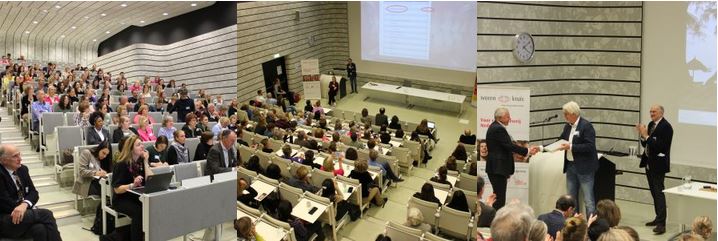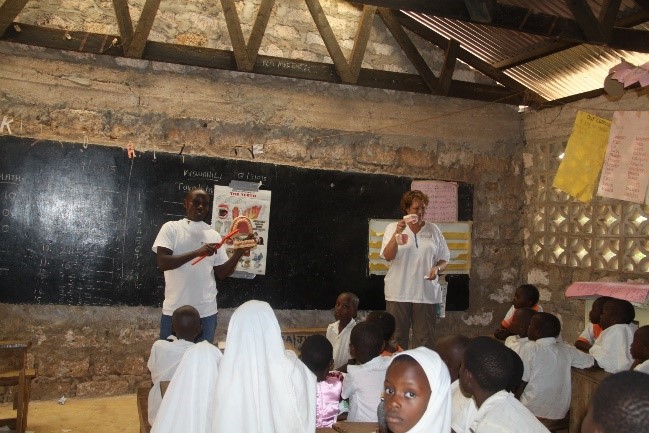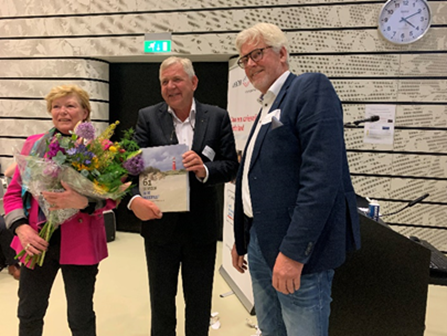Annual conference 2023
The Ivoren Kruis looks back on a successful Annual Congress. With inspiring speakers, involved partners and curious visitors, April 1, 2023 was a successful conference day.
You can read a report of this day below.
Also see the photo impression
The Ivoren Kruis looks back on a successful Annual Congress. With inspiring speakers, involved partners and curious visitors, April 1, 2023 was a successful conference day.
You can read a report of this day below.
Also see the photo impression

The Ivory Cross has noticed that there are still many people - healthcare professionals, policy makers and many other professionals - who do not yet know that caries is a disease. Given the great ambition of the Ivoren Cross to eradicate caries, the Ivoren Cross hopes to create further awareness with this conference. It is also a farewell conference for the chairman of the Ivoren Cross, Onno Hofman. During the ALV in December, he was made an honorary member of the Ivory Cross for his great achievements through his unrelenting passion to work on good oral health throughout the Netherlands. The corresponding decorations were pinned on during the GMM prior to the congress by the current chairman Albert Feilzer.
Is caries a disease? Insights and misunderstandings. Wil van der Sanden
Wil van der Sanden, chairman of the Scientific Advisory Board and program director of Dentistry Radboud UMC, kicked off with the answer: 'the message that caries is a disease has not yet penetrated everywhere, so we have to do our best'.
Last year, the Ivory Cross submitted a research proposal to ZonMw to determine the effectiveness of Gewoon Gaaf. The idea was that with all the publicity last year about bad children's teeth, this would be the opportunity to be awarded such a research grant. Unfortunately, the request was not approved. The Committee did not consider caries to be a disease. That is contrary to what scientists already proclaimed in 1940, the Ivory Cross from 1941 and what the chatGPT indicates.

Wil van der Sanden also convincingly indicates the burden of disease, including financially. 4 billion euros goes to dental defects. This can also be used to make the population a lot healthier, instead of being used as a treatment. Health care expenditure is highest in the 10-14 age group: approximately 1.1 billion euros (almost half goes to braces). In addition, a lot of money goes to (research into) treatment of the consequences of caries disease and there are only very limited resources for (research into effective) prevention of caries disease. To ensure that caries becomes manageable, it is necessary to have children come into the practice from day 0 so that parents can be coached in the field of good oral care for their child. In addition, it is necessary that there is more understanding among other professionals that the mouth is important: they must not forget the mouth!
Oral care coaches at consultation centers – current state of affairs. Cor van Loveren, Lea Kragt and Lucy Smit.
We view caries as a symptom of underlying problems.
Cor van Loveren talks about the Healthy Toddler Mouths project (Peggy van Spreuwel et al), a great collaboration between local dental care practices and the JGZ. There are 200 children in the test group, who come for consultation several times. On average, each child (and the parent) receives 97 minutes of coaching. The fact that the minister has indicated that he wants to set up a payment title for an oral care coach at the consultation office because it leads to more appropriate care is a nice boost for the project. However, various impeding and facilitating factors have been identified that influence the successful implementation of an oral care coach at a clinic.

Lea Kragt talks about determinants of oral health in children in Rotterdam. This concerns the Generation R study in which 10,000 pregnant women (inclusion 2004-2006) are followed in a prospective cohort study. One of the conclusions she draws is that intervention at a young age is actually important. Oral health should not be forgotten in the advice on nutrition. Integration of oral care into other prevention programs is easily possible, but is done far too little.
Lucy Smit is aiming for an oral healthy generation with her JGZ organization and talks about what is already being done to promote oral health. First of all, an e-learning has been made for paediatricians and youth nurses. There is a lot of attention for breastfeeding and thrush, dietary advice, advice on lifestyle and also on dental visits. At Kennemerland, children are led to the dentist at an early age, especially in deprived areas, and this has also proved to be successful: dental visits were 6% at first, but this has increased to 54%. Lucy does notice that dentists sometimes overrule incorrectly and say that the children do not have to come to the dentist from the first tooth, but only from the age of 2. This leads to dissatisfied parents, who then place less confidence in the JGZ doctor. Lucy values good cooperation with oral care providers, more than an oral care coach at the consultation office, since that is difficult to shape. Several consultation hours are required at the same time, for which there is no room, nor the necessary equipment. 'The strength of the youth doctor is that he knows something in all areas, that he sees the child himself in his environment and can call in a specialist at the right time'.
Unwanted avoidance of oral care. Financial barriers to the accessibility of dental care.' Geert van der Heijden and Sehida Begovic
In 2023, 830,000 Dutch people will live below the poverty line, this concerns 220,000 children. In March 2023, Nibud indicated that 6 out of 10 households do not make ends meet. Due to money problems, many people choose not to go to the dentist, they cannot afford it. In the image, care avoidance is a conscious choice, but this is not the case for people who have too little money. Data from the OECD (2019) shows that 435,122 people avoid dental care, in particular the 20% poorest people (12%, 348,098).
Sehida presents a nice overview of a Persona who avoids dental care for financial reasons:
An important item here is that limitations in literacy and health skills must be taken into account: 36% of the Dutch have insufficient or limited health skills (Smith AJE NTVT, 2019 (9) 126). These people will also be prone to less self-care and less good oral hygiene.
For dentists who offer unpaid help to people who have no money: register this. In fact, guidelines should be developed about where (basic) care ends.
Bariatric surgery and its relationship with dentistry. Yair Acherman
You are obese with a Body Mass Index (BMI) over 30. The incidence of obesity in adults is 13% in men, 16% in women. Under certain indications, bariatric surgery can be performed. There are different kinds:
- Gastric bypass procedure
- Roux and Y Gastric bypass = gold standard (see picture)
- Sleeve gastrectomy
- Gastric band
- Annoying operation
- Lots of heartburn
- More than 40% of people who have a gastric band require a second operation
- Bilio-Pancreatic Diversion
- Malabsorption!

The result of the preferred methods is that there is 30-35% initial weight loss (first year and a half). The patient will then gain some weight and then maintain a stable weight. 'The health insurer has recouped its money after 2-3 years'. In addition, these preferred methods appear to be a good treatment for type 2 diabetes mellitus. However, vitamin deficiencies can occur as a late complication.
Also – and now we come to effects on oral health – a third of people who have had surgery complain about having to go to the dentist more often. Effects that are seen are: dental erosion, caries and hypersensitivity (a Brazilian patient study). Vomiting could be a reason (especially with sleeve surgery and gastric band), also gastroesophageal reflux, change in oral microbiota, reduction in saliva production, lower pH and therefore reduced remineralization. How often these effects occur is not (yet?) known.
Caries in the developing world. Dental experiences through postings to Kenya
and afghanistan. Frits van Kampen
Frits van Kampen likes to close the substantive part of the conference with a positive story. He talks about the work of the Dutch Dental Care Foundation (DDC) in Kenya. The demographics of Kenya are different from the Dutch: there are much more younger people. The DDC visits schools in Kenya with a whole team consisting of a dentist, a dental hygienist, assistants and other support staff (especially for technology; equipment is also included). The team works together with Kenyan health professionals (Coho's, Community of Health Officer). The cohos come back annually, the team once every 5-6 years.
There are 4-6 deployments per year and the team is there for 2 weeks on each visit. In those 2 weeks, almost 1000 people are helped, just under 800 children and a few hundred elderly people. Children in particular are treated, especially informed. It is not too bad how many dental problems there are with the children. The people who brush their teeth (with a twig that has been taken apart a bit) usually have better teeth. In general, most of the problems can be seen in the elderly and the majority are extraction and tartar.
It's hard work from early morning to sunset. It does give a lot of satisfaction and it is nice to see that the doctor is respected there. At the end of the 2 weeks we are waved goodbye by the people there.

Farewell word Onno Hofman
Finally, Hans Prakken (treasurer and 'comrade in arms' for so many years) spoke a last word of farewell, presented a gift and flowers to Onno Hofman and his wife Yvonne.
“Onno, thank you for everything you have done for the Ivory Cross (and that is a lot)!”
Onno concludes by expressing his wishes for the future:
- “My first wish is that all existing bodies that are concerned with healthy living and a healthy body and eliminating dichotomies in our society join together in one (1) large cooperative organization.
- My second wish is that all children at schools receive a healthy meal and then brush together afterwards.”

During the break, a visit could be made to the partners of the Ivoren Cross and other organizations. We would like to thank: Haleon (Sensodyne/Paradontax), Philips, Colgate (elmex), Oral-B, Dentacure, DHIN, NVVK, VMBZ and NVVP.
Partners in prevention:
